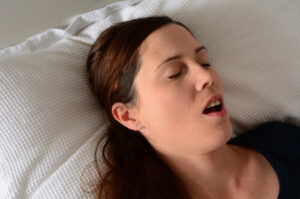Can wisdom teeth cause snoring? A question that has lingered in the minds of many, especially those who find themselves or their partners enveloped in the disruptive sounds of nightly slumbers. The relationship between our oral health and sleep patterns is a fascinating journey that intertwines through various aspects of our well-being.
Wisdom teeth, the late bloomers in our dental anatomy, have often been subjects of numerous health discussions, primarily due to the complications they can introduce. But can these seemingly innocuous molars be the clandestine culprits behind a night of restless, snoring-filled sleep?
Join us as we delve into the depths of dental science, exploring the unseen, yet potentially significant, link between the wisdom teeth that reside in the secluded corners of our mouths and the symphony of snores that permeate the tranquility of the night.
Can Wisdom Teeth Cause Snoring?

The phenomenon of pericoronitis, characterized by the inflammation surrounding a partially erupted or impacted wisdom tooth, can inadvertently sculpt a pathway to disrupted breathing patterns during sleep, potentially manifesting as snoring.
This condition, coupled with the ensuing discomfort and potential for infection, may compel individuals to adopt a mouth-open sleeping posture, further amplifying the propensity for snoring.
Thus, the dialogue between our wisdom teeth and the nocturnal symphony of snores unfolds, revealing a nuanced, multifaceted relationship that warrants a deeper, more comprehensive exploration.
The Link Between Pericoronitis and Snoring
While not directly established in scientific literature, the link between pericoronitis and snoring can be explored by understanding the physiological impacts of pericoronitis on the oral cavity and, subsequently, on breathing patterns during sleep.
- Pericoronitis is an oral health condition characterized by the inflammation of the gum tissue surrounding a partially erupted tooth, often a wisdom tooth. It can lead to pain, swelling, and sometimes, infection in the affected area.
- Snoring: This is caused by the vibration of respiratory structures due to obstructed air movement during sleep. Various factors can influence it, including obstructions or alterations in the normal airflow through the mouth and nose.
- Potential Link: The swelling and inflammation caused by pericoronitis could lead to airway obstruction, especially when the inflamed tissue is substantial enough to interfere with the normal airflow pathway. This obstruction or alteration in the airway could, in turn, enhance the likelihood or severity of snoring.
- Pain and Sleep Disruption: The pain and discomfort associated with pericoronitis might disrupt regular sleep patterns, potentially leading to irregular breathing or increased snoring due to inconsistent sleep phases and potential sleep disturbances.
It’s crucial to note that while this connection is plausible, it needs to be more widely recognized and discussed in scientific and medical literature. Therefore, further research and clinical studies would be necessary to establish a definitive link between pericoronitis and snoring.
Beyond Wisdom Teeth: Snoring Caused by Other Dental Problems
While wisdom teeth removal is often spotlighted in discussions about alleviating snoring, many other dental issues also play a pivotal role in causing snoring, warranting a comprehensive exploration.
Swollen or Sensitive Gums and Snoring
Oral health is vast, and conditions like swollen or sensitive gums can inadvertently contribute to snoring. Inflammation or swelling in the gums can alter the normal airflow in the mouth, creating the vibratory snoring sound as air pushes through the narrowed passage.
Furthermore, pain or discomfort from sensitive gums might alter sleep positions or mouth closure, indirectly influencing snoring patterns.
The Lower Jaw and Its Hidden Influence
The position and alignment of the lower jaw are crucial in maintaining an unobstructed airway. A misaligned jaw or issues related to the temporomandibular joint disorder can alter the spatial dynamics of the oral cavity.
This misalignment might push the tongue backward during sleep when muscles relax, partially blocking the upper airway and causing snoring. An oral appliance, often recommended by dentists, can sometimes reposition the jaw in a forward position, ensuring the airway remains open and reducing snoring.
Navigating Through Soft Tissue Concerns
The soft tissue in our mouth, including the soft palate, plays a significant role in snoring, especially when it becomes lax or overly relaxed during sleep. The vibration of these soft tissues, when the air doesn’t flow freely, contributes to the creation of the snoring sound.
Conditions that affect the firmness or position of these tissues or cause them to become more prone to vibration can exacerbate snoring.
Teeth Grinding and Its Stealthy Impact
Teeth grinding, a common dental issue, can not only lead to wear and tear of the teeth but also potentially contribute to snoring. The tension and positioning of the jaw and oral structures during grinding influence airway patency, thereby playing a subtle role in snoring problems.
Moreover, the stress on the temporomandibular joint and muscles might indirectly influence the airway and breathing during sleep.
Crowded Teeth and the Airway
A crowded smile or teeth can impact how well we can keep our mouths open and breathe effectively during sleep. The spatial dynamics of crowded teeth influence tongue position and other aspects of oral anatomy, potentially leading to obstructions, shallow breathing, or alterations in airflow, thereby contributing to snoring.
Obstructive sleep apnea and snoring
Obstructive Sleep Apnea (OSA) and snoring are intricately connected, both being pivotal aspects of sleep-related breathing disorders, yet they manifest distinctively and carry different health implications. Snoring, characterized by the audible vibrations of the respiratory structures, is often perceived as a mere nocturnal nuisance.
However, it can also be a harbinger of the more clinically significant condition, Obstructive Sleep Apnea, wherein the individual experiences recurrent episodes of partial or complete upper airway obstructions during sleep.
This obstruction, often precipitated by the relaxation of the throat muscles, not only intensifies snoring but also disrupts normal breathing patterns, compelling the individual to awaken to resume breathing momentarily.
The cyclical nature of disrupted sleep and intermittent awakenings in OSA can precipitate adverse health outcomes, including daytime fatigue, cognitive impairments, and an elevated risk of cardiovascular complications.
Thus, while snoring and OSA are entwined in their pathophysiology, their clinical implications necessitate a nuanced understanding and approach to management and therapeutic interventions.
Temporomandibular Joint Disorder (TMD) and Snoring

Temporomandibular Joint Disorder (TMD) and snoring unveil a complex interplay beyond mere nocturnal disturbances. TMD, characterized by dysfunction and pain in the jaw joint and muscles controlling jaw movement, can inadvertently weave a tapestry of issues, including snoring, that are more than an annoyance.
The disorder may alter the natural resting position of the jaw and tongue, potentially obstructing the airway and culminating in snoring. This is not merely a nocturnal disturbance but a potential catalyst for restless sleep and, in chronic instances, a precursor to more severe health implications such as heart disease.
Furthermore, the pain and discomfort from TMD might necessitate altered sleeping positions or cause individuals to sleep with their mouths open, exacerbating snoring, particularly if other contributing factors like swollen gums or recent wisdom teeth are removed.
Thus, maintaining optimal oral health, which encompasses managing conditions like TMD and ensuring gums sit comfortably without sensitivity or swelling, becomes paramount for the tranquility of sleep and as a proactive approach to holistic health and wellbeing.
The Underlying Issue and Effective Treatment
Addressing snoring necessitates a holistic approach, considering various factors and potential underlying issues that might contribute to the problem. From the temporomandibular joint to the mouth’s soft tissues, each element uniquely shapes our breathing patterns during sleep.
Collaborative care involving dentists and possibly other specialists is paramount in identifying the root cause and implementing effective treatment to alleviate snoring, ensuring peaceful nights, and safeguarding overall health against the serious consequences of chronic, disruptive snoring.
In this intricate tapestry of dental causes and snoring, it becomes evident that our teeth, gums, and jaw are instrumental in chewing and speech and hold a silent sway over our nocturnal breathing patterns. Thus, maintaining optimal oral health transcends beyond a bright smile and ventures into the realm of serene, restful nights, free from the disruptive and potentially life-threatening clutches of snoring.
How Snoring Affects Overall Health and Quality of Life
Snoring, often relegated to a benign, albeit bothersome, nocturnal activity, harbors the potential to cascade into a myriad of health and lifestyle implications that warrant meticulous exploration and understanding.
- Sleep Quality: Snoring can significantly impede sleep quality, not only for the individual who snores but also for those sharing the sleeping environment, thereby sowing the seeds of fatigue and diminished daily functionality.
- Cardiovascular Strain: Persistent, chronic snoring has been linked to cardiovascular concerns, including hypertension and an escalated risk of heart-related conditions, as the body grapples with intermittent oxygen deprivation during episodes of snoring-induced airway obstruction.
- Emotional and Social Impact: The pervasive nature of snoring can also permeate into emotional and social spheres, potentially straining relationships due to disrupted sleep and fostering feelings of embarrassment, frustration, and social isolation.
- Cognitive Function: The compromised sleep quality resulting from snoring can also cast shadows upon cognitive function, manifesting as difficulties in concentration, memory lapses, and diminished decision-making capabilities.
- Daytime Fatigue: The fragmented sleep architecture, courtesy of recurrent awakenings due to snoring, often culminates in daytime fatigue, impacting professional productivity and personal engagements.
- Psychological Wellbeing: The cumulative effect of disrupted sleep, social strain, and compromised daily functionality can also weigh heavily upon psychological well-being, potentially fostering stress, anxiety, and depressive tendencies.
In the grand tapestry of overall health and quality of life, chronic snoring subtly, yet profoundly, intertwines with various aspects, weaving a narrative that underscores the imperative of addressing and managing it with the gravity it duly warrants. Thus, peeling back the layers of snoring reveals a narrative deeply embedded in an individual’s holistic well-being, necessitating a comprehensive and empathetic approach to its management and resolution.
Conclusion
Knowing if wisdom teeth can cause snoring reveals a subtle yet significant connection between dental wellbeing and peaceful slumber. Wisdom teeth, particularly when misaligned or impacted, can orchestrate a disruptive snoring pattern, intertwining dental issues with sleep quality.
This relationship underscores the imperative of proactive dental care and interventions, ensuring that our wisdom teeth foster a radiant smile and pave the way for tranquil, undisturbed nights. Thus, the dialogue between wisdom teeth and snoring becomes a holistic conversation, bridging dental health to the tranquility of our sleep and the vitality of our waking hours.
References
Pericoronitis: What You Should Know
https://www.healthline.com/health/pericoronitis
The title for the PubMed article is not directly accessible from the link provided. To get the title, one would typically need to visit the page and extract the title from there.
Snoring
https://www.mayoclinic.org/diseases-conditions/snoring/symptoms-causes/syc-20377694
Snoring
https://medlineplus.gov/snoring.html
